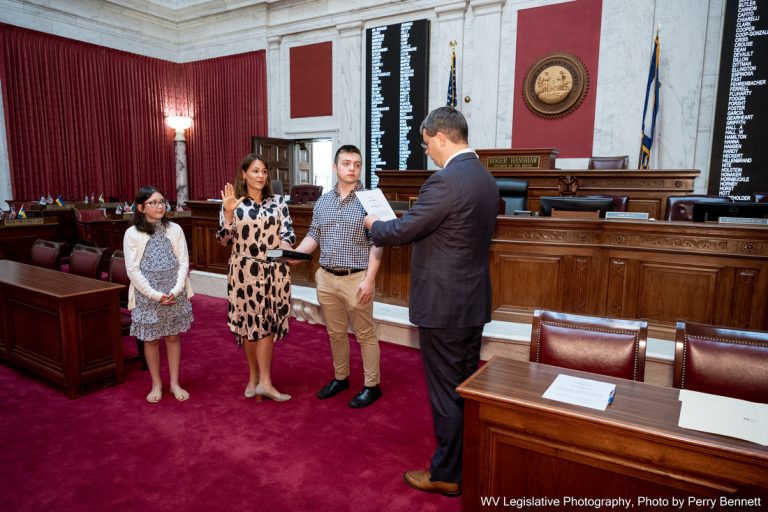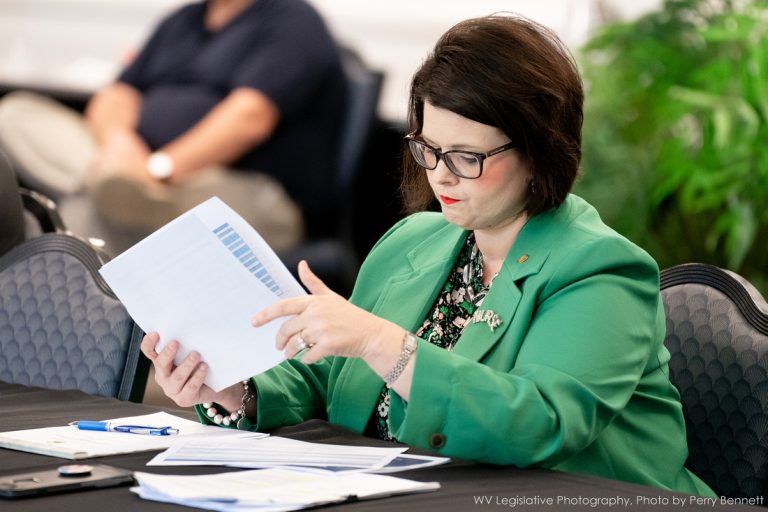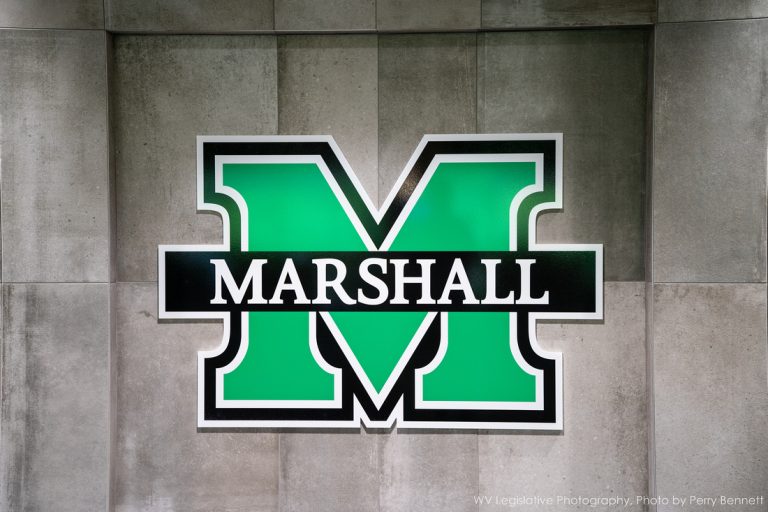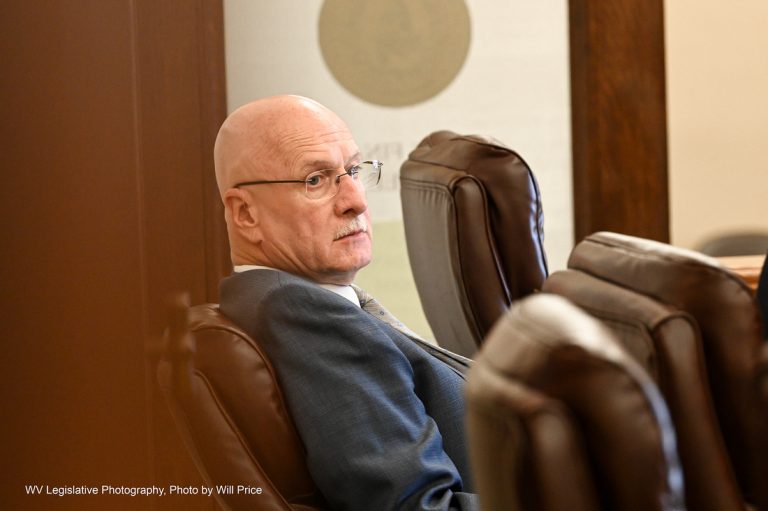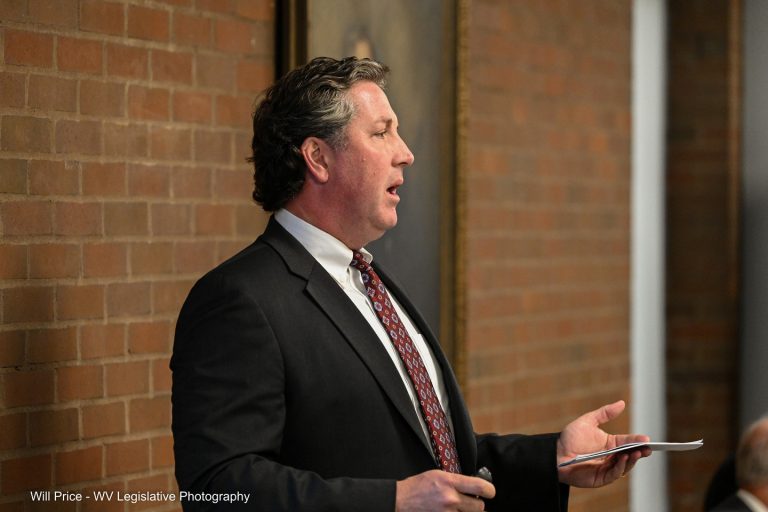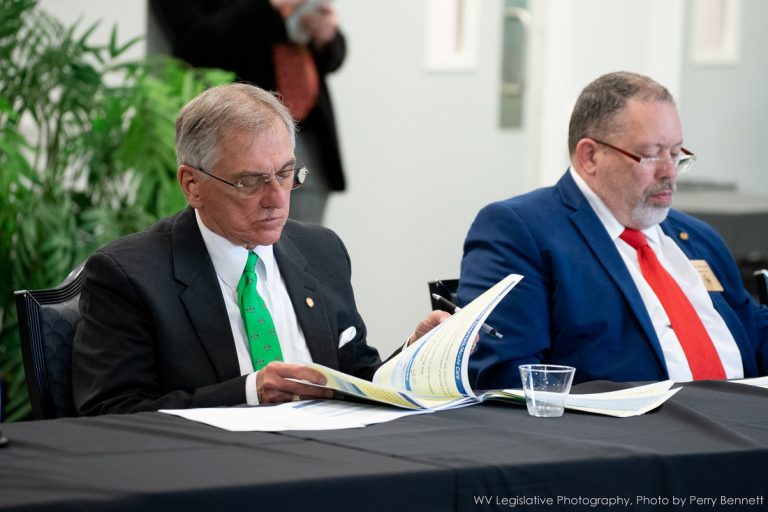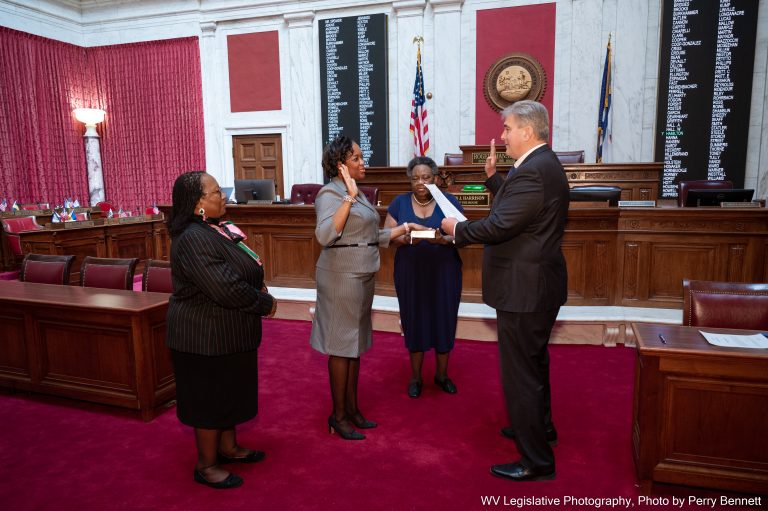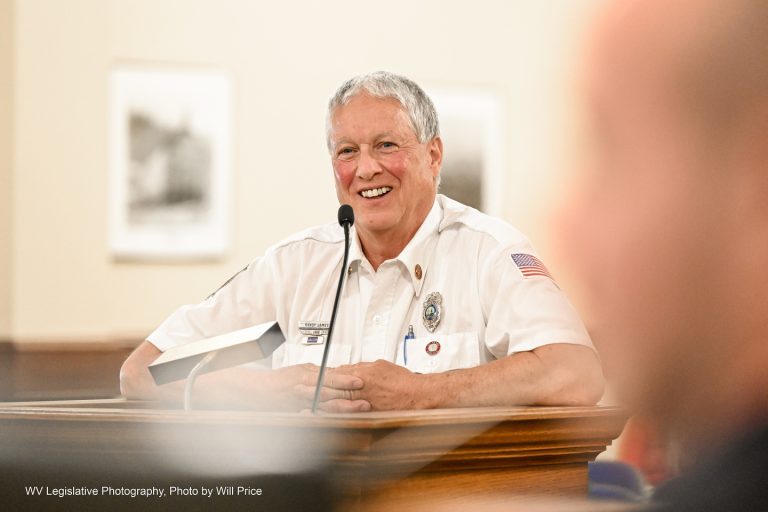Diana Winzenried Sworn in as Delegate for the 4th District
Interim Report: Committee on Health
The Joint Committee on Health met this morning and heard a presentation on substance use disorder.
Dr. Stephen Loyd from Tennessee stated that addiction is about genetics, trauma, and opportunity. It is not a moral failing, but a disease that affects the frontal lobe, which controls impulse and empathy. Addiction is complex, but it is treatable.
Recovery requires an ecosystem for success. In the system, referral sources identify individuals suffering from SUD. Those referral sources include the criminal justice system, treatment providers, counselors, community support groups, and even the individual themselves. Treatment needed for individuals with SUD is employment support, life skills development, health checks (mental and physical), education support, peer support, stable support, and case management. With these treatments and support, positive outcomes with employment, transportation, housing, and social support.
In order to achieve these goals, we must focus on harm reduction including access to naloxone, syringe exchange programs, and voluntary reversible long-action contraception. There should be increased access to medications for opioid use disorder such as suboxone, naltrexone, and methadone. Although it is controversial, Dr. Loyd said it is necessary specifically to treat fentanyl use. Additional support is needed during pregnancy and postpartum with expanded services for neonatal withdrawal syndrome. Treatment should be provided in prisons and jails with handoff programs and recovery services for post-incarceration, especially housing.
Prevention strategies need to be in place to prevent the next generation from continuing with substance use. Data collection and research support are needed to continue using the best practices for prevention and recovery.
Interim Report: Joint Committee on Education
The Joint Education Committee met this afternoon and heard a presentation on Marshall’s program “Marshall for All, Marshall Forever.”
 Marshall University was created in 1837 and gained university status in 1961. In 2022, Marshall announced “Marshall for All” with the goal that in 10 years no student will graduate with debt. Marshall currently serves 11,000 students of which 77 percent are from WV and 54 percent are first-generation students. The 1,770 faculty and staff serve students at four locations.
Marshall University was created in 1837 and gained university status in 1961. In 2022, Marshall announced “Marshall for All” with the goal that in 10 years no student will graduate with debt. Marshall currently serves 11,000 students of which 77 percent are from WV and 54 percent are first-generation students. The 1,770 faculty and staff serve students at four locations.
The University’s role is to provide opportunities for individual success and innovative ideas for a positive economic impact.
Higher Education is facing a huge transition. As of 2025, there will be 21 percent fewer high school graduates in WV. Also as of 2025, there will be a drop of 18 percent of graduates interested in college. Students need a more affordable and flexible education to achieve their goals.
A major issue facing higher education is the increasing debt. Although Marshall is more affordable than many of its instate and regional peers, students still find themselves in tens of thousands in debt.
Higher education is being reinvented with the digital transformation. Students have knowledge of economic demands and are looking to non-traditional providers for low-cost, anytime/anywhere access to education to obtain relevant degrees and certificates. Practicality is more important than prestige. With these changes, online degrees and micro-credentials are increasing as full-time in-person enrollment is decreasing. To stay relevant, universities must pivot and offer these courses.
Marshall’s Strategic Roadmap to Future Prosperity is a transformation to promote long-term sustainability and lead with the best to leapfrog and become a reference case. By 2027, the University plans to be back in the green financially by growing students, not fees; investing in the team; taking care of the structures; and managing resources.
In 2037, Marshall University will be 200 years old. The plan is 100 percent of graduates will have job placement and zero student debt. To do this, the University will need to raise $300 million in 10 years to phase in the zero-debt plan beginning with the first 100 students in the fall of 2023. The University plans to have $150 million in funded research, grants, and contracts with a 3x return on startups. Stakeholders will make a 30x return for every $1 invested. The plan is in line with the performance-based funding formula.
Marshall looks to serve more people by expanding the student pool to focus on non-traditional students in addition to high school seniors. The University will offer an in-demand curriculum on demand and distinctive value propositions.
The Committee also heard from Lexia Learning on Early Literacy Professional Development, whose mission is to create opportunity for every student through the power of literacy education.
Interim Report: Joint Committee on VFD and EMS
Lawmakers continued discussions on possible funding for Volunteer Fire Departments and EMS units during interim meetings Sunday afternoon in Huntington.
The conversation centered around House Bill 3153, which failed in the final hours of the 2023 Regular Session. The bill would have split $12 million between the state’s fire departments and emergency medical services.
Much of the debate on the bill centered on whether to provide funding by way of an increase to the surcharge on insurance premiums, which would ensure the funding in perpetuity, or through a one-time allotment of surplus lottery money.
Lawmakers sounded optimistic Sunday that they may be nearing a compromise. Delegate Mike Honaker (R-Greenbrier, 46), an emergency management professional himself, informed the committee that they currently have a working compromise bill that they believe can be passed in a special session.
Also on Sunday, members heard from Kari Mika-Lude, PhD, on the topic of mental health wellness for first responders. This included a deep dive on the pressures and stressors first responders face and the difficulty they often have in getting the timely mental health services that they need.
Lawmakers discussed a possible comprehensive first responder wellness plan to consider during the next regular session.
Interim Report: LOCEA
The Legislative Oversight on Education Accountability met on May 7th to hear policies that are or have been up for public discussion with the Board of Education and WVSSAC.
WVBE Policy 5901, Regulations for Alternative Certification Programs for the Education of Teachers, will be refiled with a 30-day review to add revisions including changes made with House Bill 3035. The revised policy allows for more flexibility to accept candidates into alternative certification programs who met the minimum educational qualifications leading to initial teacher certification.
WVBE Policy 6204, School Closings or Consolidations, had nine changes, four were simple language changes and five were new procedures, including supporting data requirements and extended review periods.
WVSSAC 127 CSR 1, Constitution, made three changes, including a second confirmation vote, increasing annual honoraria payment from $500 to $1,000, and changes to the Board of Control.
WVSSAC 127 CSR 2, Athletics, Provisions Governing Eligibility, expands extracurricular eligibility to allow students who are in homeschool, private school, microschools, etc. at public schools. The policy also adds in House Bill 2820, with one-time transfer 9 through 12.
WVSSAC 127 CSR 3, Provisions Governing Contests, creates flex days for practices. Each sport program may use 12 flex days from Monday of Week 49 through Friday of Week 48 of the following academic year. A flex day is a day outside of the regular season and outside of the three-week practice window when a coach can have sport-specific contact with student-athletes.
WVSSAC 127 CSR 4, Provisions Governing Conduct, revises the length of suspensions as a consequence of ejection by an official.
Interim Report: Joint Standing Committee on Insurance and PEIA
On Sunday afternoon, the Joint Standing Committee on Insurance and PEIA listened to testimony from Matt Walker, Executive Director of the Independent Pharmacy Association of West Virginia, regarding the state’s Pharmacy Benefit Management program and independent pharmacy reimbursements.
The Legislature is in Huntington on the campus of Marshall University through Tuesday for May interim meetings.
The West Virginia Independent Pharmacy Association was formed in 2016 to provide a unified voice for independent pharmacies in public policy discussions. The organization represents more than 100 community pharmacies across the state.
Currently PEIA uses a pharmacy benefit management program, Express Scripts Inc., to process prescription drug claims. Walker emphasized it is important for PEIA to use a PMB program to process the large number of claims, but that the manner in which it has been used has caused frustration for pharmacists and pharmacy owners around the state.
According to Walker, pharmacies are reimbursed by PEIA well below the costs of purchasing the prescription drugs at 95 percent of brand drugs. While pharmacy reimbursements for generic drugs allow pharmacies to make a small profit, those profits are often negated due to the losses from ordering brand name prescription drugs.
Walker warned lawmakers of possible future pharmacy access issues for those insured by PEIA, noting that Kroger has already left Express Scripts, meaning they no longer accept PEIA to fill prescriptions. Walker said many smaller pharmacies are also considering dropping PEIA due to the financial difficulties the program creates.
Walker recommended PEIA consider a model used by West Virginia’s Medicaid program using the National Average Drug Acquisition Cost (NADOC) plus $10.49 reimbursement system. NADOC is a national survey showing what pharmacies are paying for prescription drugs.
Interim Report: LOCHHRA
The Legislative Oversight Commission on Health and Human Resources heard a presentation on care in mental health facilities on Sunday, May 7th.
The DHHR has implemented the 988 Suicide and Crisis Lifeline. By dialing 988, individuals connected to crisis counselors with the National Suicide Prevention Lifeline. The department has implemented mobile crisis services for children statewide.
The department has expanded its Assertive Community Treatment (ACT), which provides several community-based rehabilitative mental health services for adults with a history of frequent psychiatric hospitalization. This program allows individuals to get the services they need while living in the community of their choosing.
The presenter provided a list of treatment services available. Currently, there are five Psychiatric Hospitals (Acute Care), with two of the facilities offering services to children. There are 705 beds within these five hospitals, of which 52 beds are for children.
Three Psychiatric Residential Treatment Facilities are in the state. These are full-time secure facilities for individuals who need around-the-clock care.
A Crisis Stabilization Facility for children is under development in Elkins, WV. There are 677 licensed and unlicensed group homes. Forensic Group Homes are being discussed. These homes are for individuals who are unable to stand trial or are found not guilty due to mental illness and are considered a danger to themselves or society.
The State has 30 substances use disorder facilities with 1,581 beds and 109 Recovery Support Residences with 1,519 beds.
The department does face workforce shortages in most facilities, which is delaying statewide adult mobile crisis services, ACT in the eastern panhandle, additional acute care beds for children, crisis stabilization for children, forensic group homes, and adolescent SUD treatment. The shortage also makes it difficult to appropriately place individuals with IDD and mental health dragonesses.
The department is also creating a plan for IDD patients at Sharpe and Bateman Hospitals. The plan is in its research phase as the agency is visiting the hospitals and studying how they work in addition to gaining a better understanding of IDDs. They hope to facilitate a better discharge process for individuals.
Anitra Hamilton Takes the Oath of Office
During a ceremony in the House of Delegates Chamber this afternoon, Anitra Hamilton took her oath of office, becoming the Delegate from the 81st Delegate District in Monongalia County. Delegate Hamilton replaces former Delegate Danielle Walker who recently resigned. Delegate Hamilton (D-Monongalia) was appointed to the position by Governor Justice on April 26th, 2023. Her committee assignments, office assignment and other information will be announced at a later date and published on the website.
Standing with her in the front of the House Chamber were her mother Francis Anthony and Barbara Littles, as well as Leo and Regina Riley nearby, and they were joined by several other friends and well wishers as she took her oath.
Administering the oath of office was the Clerk of the House of Delegates, Steve Harrison.
Interim Report: Joint Committee on VFD and EMS
Fire Chiefs Association President Randy James told lawmakers during an April interim meeting Tuesday that the lack of funding for West Virginia’s volunteer fire departments and emergency medical services has reached a crisis level.
James pointed out that volunteer fire departments have not been given a line-item budget increase since 2005 and emergency medical services have never had one, all while the departments are facing skyrocketing operation costs, along with a precipitous decline in retention and recruitment.
James mentioned that 15 EMS squads have closed their doors since the beginning of 2022 alone. While volunteer fire departments are more reluctant to close, with the lack of state funding, retention and recruitment is a challenge, particularly because of the fundraising commitments that come with the job.
James emphasized that these departments need state funding so volunteers can spend their time training, maintaining equipment and facilities, and responding to calls, not serving hot dogs or organizing raffles.
James mentioned a lack of morale among VFD and EMS personnel when a bill that would have split $12 million between the state’s fire department’s and emergency medical services failed late in the 2023 session.
While lawmakers agree that fire and medical services are in dire need of the funding, they struggle to find consensus on a source of that money, with some favoring increasing a surcharge on fire and casualty insurance policies, and others preferring to use lottery funds.
James told lawmakers that volunteer fire departments and EMS personnel combined their lobbying efforts for funding this year and they are committed to doing that in the future.
Senator Bill Hamilton (R-Upshur, 11) mentioned that if something is not done soon, volunteer fire departments will inevitably close their doors, resulting in steep increases in homeowners insurance rates in those communities.
Hamilton and other lawmakers said they are determined to solve this problem by securing the funding for these vital services at some point in 2023.
Interim Report: LOCRJCFA
The Legislative Oversight Committee on Regional Jails and Correctional Facilities Authority met this afternoon.
The committee heard from the Division of Correction and Rehabilitation regarding employee recruitment, retention, vacancy rates, and the status of the juvenile population.
At least eight prisons have a vacancy rate of 40 percent or more. The National Guard is still assisting. This has led to guard members seeking full-time work within the prisons. Maintenance continues to be an issue at various facilities. Recruitment is continuing and improving. The Division has been encouraging facilities to be proactive when interest is expressed by individuals who stop by requesting information. The Division is changing the application process to make it less intimidating.
The juvenile centers have about 325 individuals in the population. There are 76 kids in the aftercare program, which is like adult parole. This program allows kids to receive assistance finding housing, obtaining licenses, and job assistance. Juvenile centers must adhere to children’s nutrition requirements and food is prepared on the premises.
The committee heard a brief overview of House Bill 3552 (2023 RS). The bill amends per diem jail costs. This bill established a tiered system for local governments to pay per diem charges for the incarceration of individuals in regional jails. Per diem rates are set at $54.48, subject to changes as required by the State Budget Office. Under this tiered system, local governments will be allotted inmate days calculated by the total number of residents multiplied by .52. For each inmate incarcerated up to 80% of those allotted days, the local government will pay 80% of the per diem charge. For the incarceration of individuals between 80% and 100% of the allotted days, the local government will pay 100% of the established per diem rate. For the incarceration of individuals over 100% of the allotted days, the local government will pay 120% of the per diem rate. The bill also authorizes counties to seek reimbursement through a memorandum of understanding from certain municipalities for up to one day of incarceration of inmates arrested by the municipality on county charges. The intent of the bill is to reduce the fiscal burden on counties and the effective date is June 9th.


